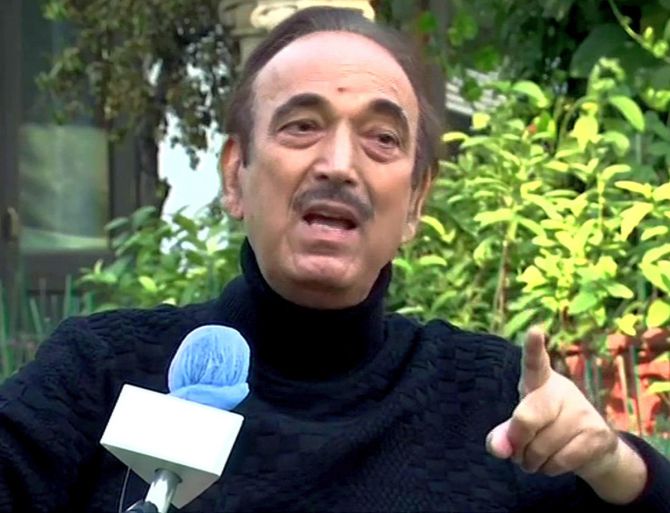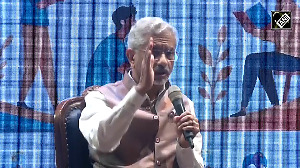Veteran Congressman Ghulam Nabi Azad, a constant fixture in the organisation's decision-making process since the tumultuous times of Emergency, finally fell out with his mother party on Friday after a not-so-smooth relationship with the top brass in the past couple of years.

"The situation has become irretrievable", Azad, 73, said in his parting shot to Sonia Gandhi, whose trusted confidante he remained right from the time of Sitaram Kesri's unceremonious exit as the party's chief in 2000.
Known for his ability to negotiate the challenging twists and turns of body politic, Azad was often sent by the leadership to fire fight any situation -- be it a crisis in a faction-ridden state unit like Haryana or cobble up a new alliance and government in Karnataka with the JDS.
But things were never the same between Azad and Gandhi after the summer of 2020 when he headed the 'group of 23', seeking a leadership and organisational change. Observers say the relationship broke irretrievably after the Congress chief denied Azad, the sitting leader of opposition in Rajya Sabha, a renomination to the upper house last year.
Many an eyebrow were raised when Prime Minister Narendra Modi profusely praised Azad while delivering an emotional speech during the Congress leader's farewell in Rajya Sabha in 2021. In return, Azad was also effusive in his praise for Modi.
Again the Congress did not take it easily when the Modi government conferred the Padma Bhushan on Azad. Senior leaders called it a political decision and not one on merit.
And very recently, Azad resigned from the post of head of the Jammu and Kashmir Congress campaign committee hours after he was appointed.
The writing was on the wall since then.
Azad's exit was simultaneously a shock and a surprise to sections across the Congress, considering he was a key figure in the party's decision-making processes through the Sanjay Gandhi days and the tumultuous times of the Emergency under Indira Gandhi, followed by the Rajiv Gandhi era, the Narasimha Rao period and eventually the tenure of the longest serving Congress president Sonia Gandhi.
Born in 1949 in Soti village of Bhadarwah in Jammu and Kashmir's Doda district, Azad made his way up the ladder in the Congress and went on to become the chief minister of his home state in 2006.
In his almost 50 years in politics, he has been a two-term Lok Sabha and a five-term Rajya Sabha member, besides occupying all top Congress positions and a union minister in all Congress governments since 1982. He also remained as two-term member of J&K Legislative Assembly in 2006 and 2008.
Many Congress leaders term Azad's move as an "outright betrayal", even as the old warhorse kept both his supporters and critics guessing about his future moves following his resignation from all Congress posts today.
"Some of my other colleagues and I will now persevere to perpetuate the ideals for which we have dedicated our entire adult lives outside the formal fold of the Indian National Congress," said the former chief minister of Jammu and Kashmir, who appears set for a fresh innings in the Union Territory where the election process has begun with the finalisation of the electoral rolls.
Azad's name will be etched in Congress history as a quintessential rebel who raised a banner of revolt against the formidable first family of the Congress and even managed to bring 23 leaders together in a group called G23.
The G23, dissenters to some, preferred to call itself the reformist panel which sought meaningful organisational overhaul, an advisory role for the Gandhis and a new full-time party chief.
The letter G23 wrote to Sonia Gandhi in August 2020, under the leadership of Azad, laid the ground for the former minister's eventual divorce from the party today.
Azad entered the political fray as secretary of the Block Congress Committee in Bhalessa in Jammu and Kashmir in 1973 to 1975 and moved up the ranks to become the president of the J&K Youth Congress in 1975-76.
He won his first parliamentary election in 1980 from Washim in Maharashtra and became a minister at the Centre under Indira Gandhi in 1982. He later served under all Congress prime ministers - Rajiv Gandhi, Narasimha Rao and Manmohan Singh.
Azad was first given a Rajya Sabha ticket in June 1991.
Azad said he joined the Indian National Congress in Jammu & Kashmir in mid 1970s when it was still a taboo to be associated with the party given its chequered history in the state from August 8, 1953 onwards the arrest of Sheikh Mohammad Abdullah being the nadir of its "political myopia".
He said he was inspired by the ideals of Mahatma Gandhi, Jawaharlal Lal Nehru, Sardar Patel, Maulana Abul Kalam Azad, Subhash Chandra Bose and other leading lights of the freedom struggle from his student days and joined the party at the personal insistence of Sanjay Gandhi.
From 1977 onwards he was general secretary of the Indian Youth Congress led by Late Sanjay Gandhi and went to jail several times, his longest period in Tihar jail being from December 20, 1978 to end of January 1979.
After Sanjay's demise, he took over as the National President of IYC in 1980 and had the privilege of inducting Rajiv Gandhi into the Indian Youth Congress as a Member of the National Council on Sanjay Gandhi's first death anniversary on June 23, 1981.
Azad also served as AICC general secretary with every president of the Congress since the mid 1980s and was a member of the Congress Parliamentary Board headed by Rajiv Gandhi till his death in May 1991 and later with Rao till the latter decided not to reconstitute the Congress Parliamentary Board in October 1992.
He was also a member of the Congress Working Committee, the highest decision-making body of the Congress, continuously for nearly four decades both in an elected and a nominated capacity and served as AICC general secretary in-charge of every state and Union Territory of the country at one point of time or the other over the last 35 years.
Azad claimed that he won 90 per cent of states that he was in-charge from time to time and finally served as the Leader of the Opposition in the Rajya Sabha for seven years.











 © 2025
© 2025